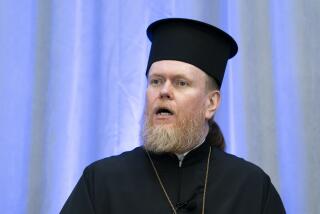700 Dedicate Plaque in Memory of Martyred Polish Priest
- Share via
More than 700 people of Polish descent gathered Sunday at the Pope John Paul II Polish Center in Yorba Linda to dedicate a plaque in memory of Polish priest Jerzy Popieluszko, two years to the day after he was kidnaped and killed by members of the Polish Security Service.
After the Rev. Joseph A. Karp, pastor of the shrine, blessed the plaque, Chris Ciesiolkiewicz, president of the Polish American Congress in Southern California, vowed that Popieluszko’s memory would never dim.
He said the priest’s death had only strengthened Poles’ resolve to regain their freedom, as exemplified by Poland’s outlawed Solidarity union.
“Solidarity lives. Solidarity is stronger. Father Popieluszko’s inspiration will help us carry on the struggle. Poland will be free, there is no doubt about it. Someday, Poland will be free,” Ciesiolkiewicz declared.
For Poles, the Catholic Church is such a part of their culture that it is inseparable from politics, Karp said.
The Solidarity logo is part of one of the Yorba Linda shrine’s stained-glass windows. Solidarity sashes were worn by members of the procession entering the building for a Mass Sunday in Popieluszko’s memory. Bunting hung on the altar repeated the union name in Polish: “Solidarnosc.”
Popieluszko, a parish priest in Warsaw, became a national hero after his outspoken criticism of the nation’s Communist regime and his support for Solidarity. He was kidnaped Oct. 19, 1984, beaten, strangled and dumped in a reservoir. Four members of the Polish Security Service later were convicted of carrying out the murder. All four were sentenced to long prison terms, some of which were reduced last week.
Popieluszko’s funeral drew 100,000 mourners to his small church in Warsaw. His body, displayed in a coffin, showed the effects of a severe beating.
Photographs of Popieluszko, dead and alive, were tacked to a bulletin board Sunday. But what most attracted the crowd’s attention was the bronze bas-relief of Popieluszko’s face, commissioned in Poland and included as the centerpiece of the large, still unfinished memorial plaque.
The bas-relief shows Popieluszko’s lean face, mouth slightly open with eyes cast downward in a distant, somewhat dreamy stare.
The plaque describes him as a “martyr of faith, apostle of truth and love, defender of human rights and patron of Solidarity. . . . We dedicate our undying love and devotion to him and his ideals.”
The ceremony drew Polish priests from as far away as the San Francisco Bay area and Monterey to help conduct the Mass. After the ceremonies concluded, the standing-room-only audience filed out into a courtyard while singing the contemporary Polish hymn “God and Homeland”:
So many times you wanted freedom,
So many times it was suppressed by hangmen,
But always it was done by foreigners,
Whereas today brother kills brother.
The parishioners, who come from throughout Orange County, applauded as the Solidarity banner was pulled away, revealing the plaque. At the end of the dedication speeches, some placed flowers and candles under the plaque.
The congregation, now comprising 1,800 families, has existed for 10 years, Karp said. It met in borrowed rooms until last December, when the first service was held in the congregation’s new buildings at 3999 Rose Drive.
Karp said the plaque was a milestone for the shrine. “We have many members of Solidarity who were expelled from Poland,” Karp said. “This is a way for them to vent those hurts, those resentments.”
The idea for the plaque emerged almost as soon as news of Popieluszko’s death arrived, Karp said. One parishioner, Mieczyslaw Michael Dutkowski, an accountant and officer of the Polish American Congress, began collecting donations and arranging for the plaque’s design and manufacture, he said.
A temporary version of the plaque was installed for Sunday’s ceremony because the final version was delayed, due to the manufacturer’s inability to reproduce certain letters of the Polish alphabet, Karp said.
More to Read
Sign up for Essential California
The most important California stories and recommendations in your inbox every morning.
You may occasionally receive promotional content from the Los Angeles Times.













